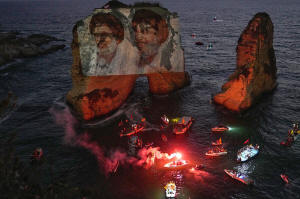Lebanese army chief briefs government on Hezbollah's disarmament as
Israel strikes kill 2
[October 07, 2025]
By BASSEM MROUE
BEIRUT (AP) — Lebanon's army chief on Monday briefed the government for
the first time on its plan to disarm the militant group Hezbollah, while
Israel carried out airstrikes in southern and northeastern Lebanon that
killed two people.
Army commander Gen. Rudolph Haikal's report came a month after the
Cabinet discussed the military's plan to put all weapons under state
control.
No details of his briefing were immediately shared. Information Minister
Paul Morcos told reporters that the Cabinet decided to keep the plan and
all discussions about it “secret.”
Hezbollah has rejected the plan, saying it won’t discuss disarmament as
long as Israel continues to occupy several hills along the border and
carries out almost daily strikes. The group was badly weakened during
its latest war with Israel that ended with a ceasefire in November.
The Lebanese government first aimed to disarm Hezbollah by the end of
the year, but officials later said resources are too limited to meet the
deadline. The current aim is to fully clear a stretch along the
Lebanon-Israel border, defined as south of the Litani river, by the end
of November before moving into further phases.
Lebanon's army has suffered from the repercussions of the country's
economic meltdown six years ago. Western and Arab countries have offered
support. Last week, the Trump administration approved $230 million to
Lebanon’s army and police forces.
Ed Gabriel, president of the American Task Force on Lebanon, a nonprofit
that aims to build stronger U.S.-Lebanon ties, told journalists on
Monday that the $190 million for the armed forces and $40 million for
Internal Security Forces will be mainly in training and equipment.
Gabriel, who met several top officials in recent days including Haikal
and President Joseph Aoun, said the president is "determined to get
things (disarmament) done.”

[to top of second column]
|

Portraits of two former Hezbollah leaders Hassan Nasrallah, right
and Hashem Safieddine, left, are projected onto the landmark Raouche
sea rock during an event commemorating their deaths in Israeli
airstrikes nearly a year ago, in Beirut, Lebanon, Thursday, Sept.
25, 2025. (AP Photo/Hussein Malla)

He added that the Lebanese government has to make it clear that it
is not backing down from full disarmament of Hezbollah, and said a
weakness in the plan is that “they don’t have a specific timetable.”
He added that the international community wants Hezbollah’s
“strategic weapons” such as precision-guided missiles and drones to
be removed.
A deadly Israeli drone strike
Around noon Monday, an Israeli drone strike near the southern city
of Nabatiyeh killed a Hezbollah member, who was blinded last year in
Israel’s exploding pagers attack, along with his wife in their car.
Shortly afterward, Israeli airstrikes struck Lebanon’s northeastern
region of Hermel.
Israeli military said the Hezbollah member killed, Hassan Atwi, was
a key official in the group’s Aerial Defense Unit. The military said
the airstrikes on northeast Lebanon struck training centers for
Hezbollah’s elite Radwan Forces.
The most recent Israel-Hezbollah war killed more than 4,000 people
in Lebanon, including hundreds of civilians, and caused an estimated
$11 billion worth of destruction, according to the World Bank. In
Israel, 127 people died, including 80 soldiers.
The war started when Hezbollah began firing rockets across the
border on Oct. 8, 2023, a day after a deadly Hamas-led incursion
into southern Israel sparked the war in Gaza. Israel responded with
shelling and airstrikes in Lebanon, and the two sides became locked
in an escalating conflict that became a full-blown war in September
2024.
All contents © copyright 2025 Associated Press. All rights reserved |